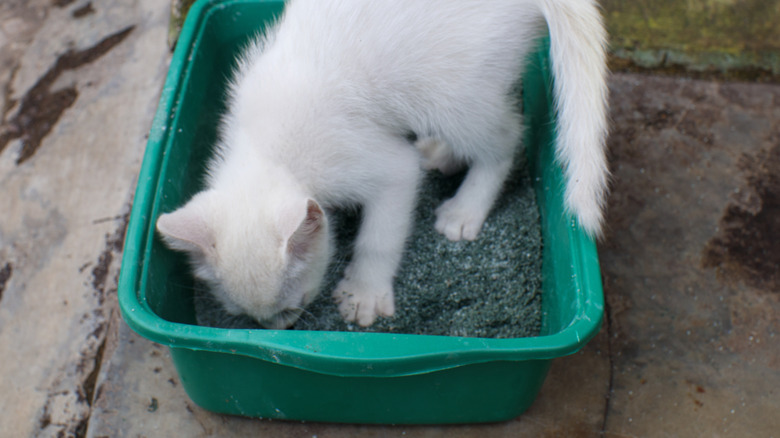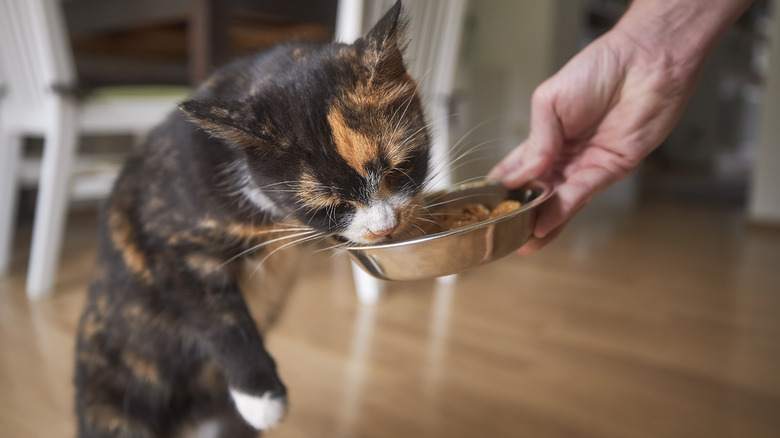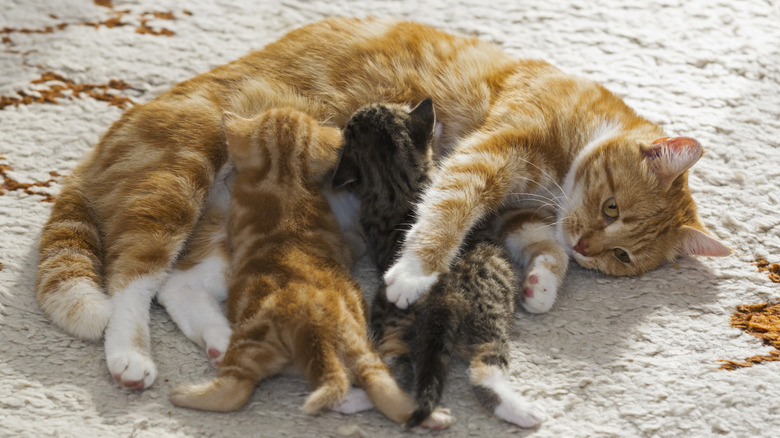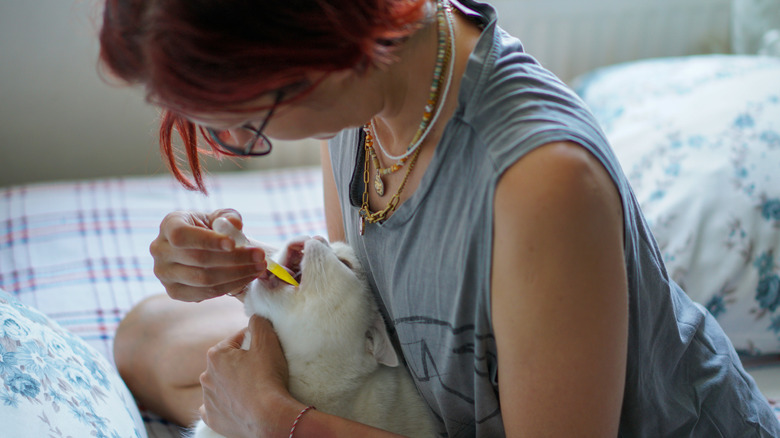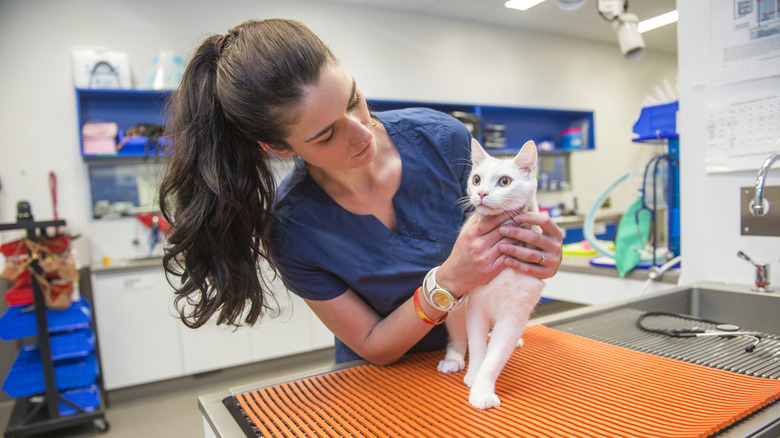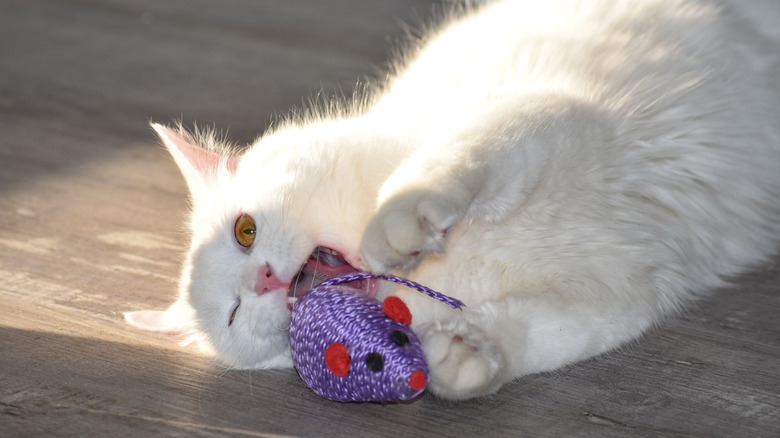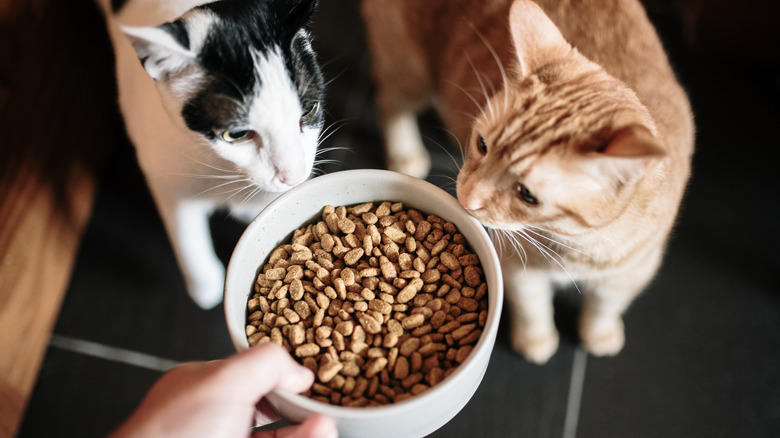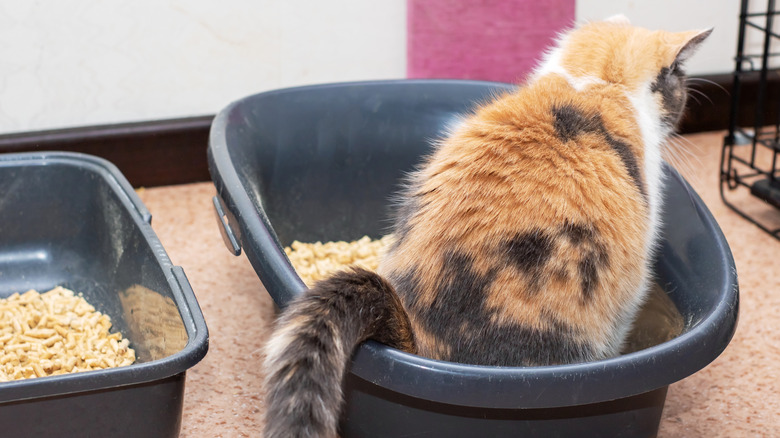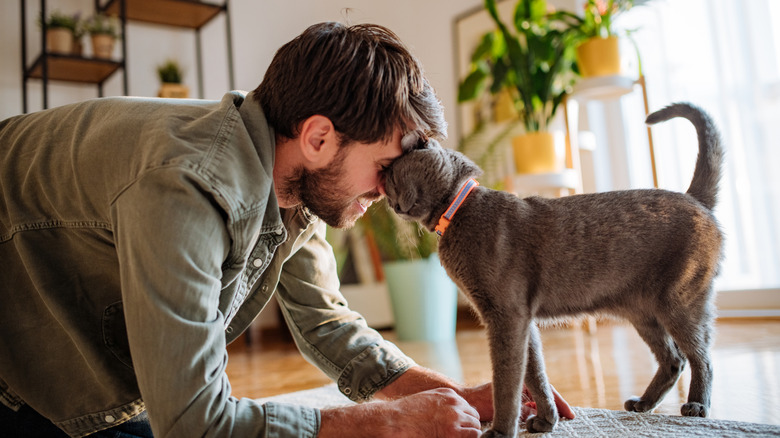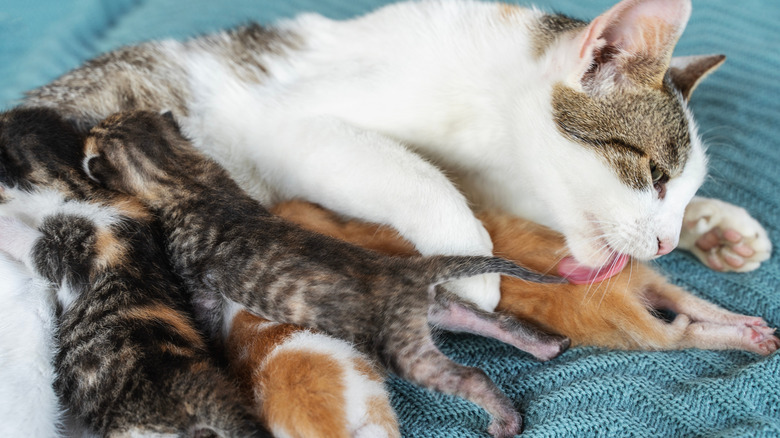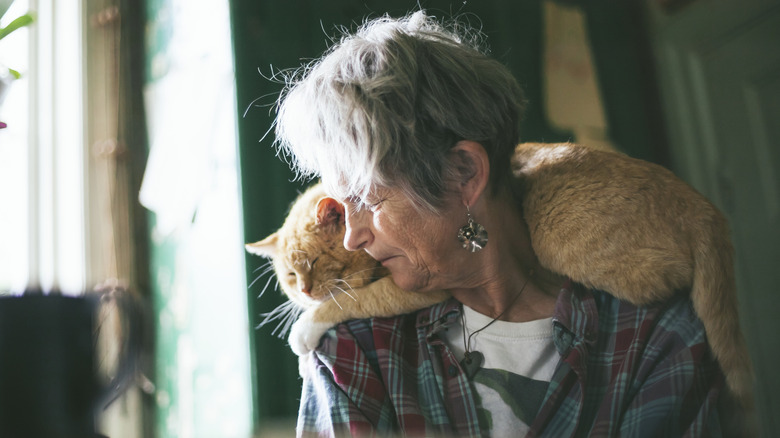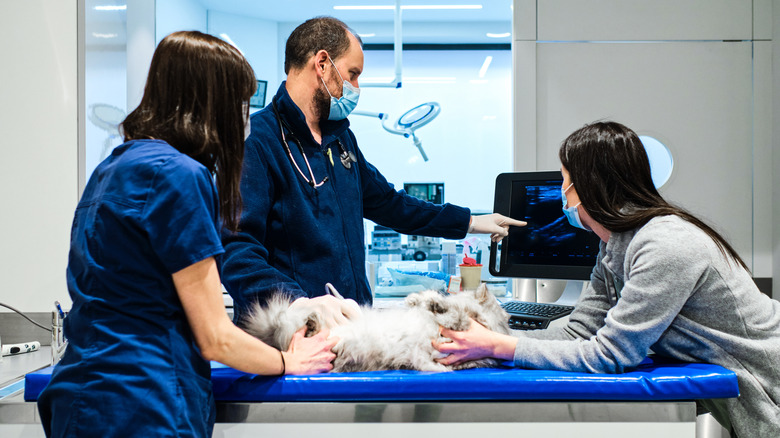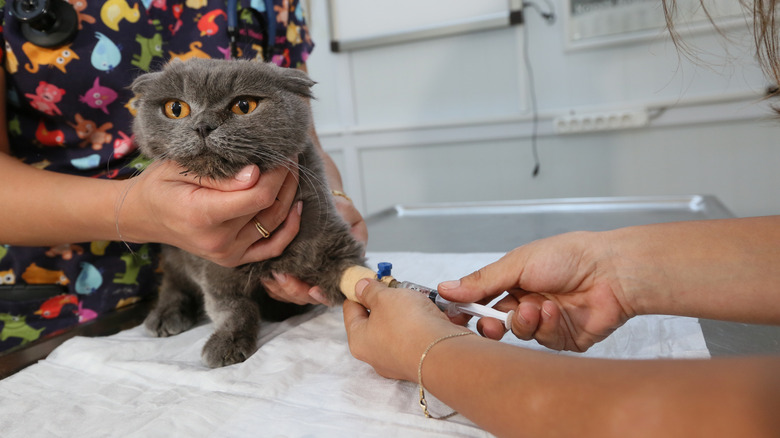13 Reasons Cats Eat Poop That You Shouldn't Ignore (And What To Do About It)
It's no secret that cats can be weird (read: adorable). Some of the funniest things that cats do are bounce around the house, chatter, stare at nothing, and chew on grass, but when they start displaying unusual behaviors, such as eating poop, you shouldn't ignore it. This behavior is called coprophagia, and although it's disgusting to humans, cats don't associate eating poop with something negative; they're just acting in response to their body's cravings. There are several reasons your cat might be munching on poop, whether their own or another cat's, and sadly, it's usually not just out of curiosity. Instead, it could be reasons such as a dietary deficiency, intestinal parasites, the effects of certain medications, stress or anxiety, or boredom, among others.
The good news is that most of these behaviors can be rectified with a diet change, deworming medication from the vet, calming sprays, extra attention or exercise, frequent litter box changes, or redirection. But, sometimes, all you can do is spot the symptoms and take your cat to the vet for a diagnosis and treatment. With that said, let's take a further look into these reasons and what you can do about them.
1. Dietary deficiencies can lead cats to eat poop
There are so many cat diet options, with some widely accepted and others widely debated. Common types are dry food (like kibble), wet food (typically from a can), and a combination of the two. Less common types are homemade and raw diets. Dietary deficiencies tend to arise in cats when they're fed low-quality cat food without animal protein, and this is more likely in homemade and raw diets because owners can struggle to get in the right amount of nutrients. Only high-quality food that's nutritionally balanced and complete, compliant with the Association of American Feed Control Officials, and life-stage appropriate should be fed to your cat.
A vitamin or mineral deficiency caused by an unbalanced diet may cause your cat to crave non-food items, including poop. A poor diet can also result in weight loss, skin problems, lethargy, diarrhea, vomiting, and a coat that's seemingly lost its luster. If you're adamant about cooking your cat a homemade meal or feeding it a raw diet, work with your vet to ensure it meets your cat's nutritional needs.
2. Intestinal parasites can make cats want to eat poop, too
Sadly, various types of intestinal parasites can affect your cat's health. The most common types of worms found in cats are roundworms, whipworms, hookworms, and tapeworms, but there are other intestinal parasites to watch out for, too. Intestinal parasites are especially prevalent in kittens, who get them from their environment or their infected mothers' placentas. It's important to deworm kittens as early as 3 weeks old so that the worms don't stunt their growth. Adult cats can get worms by swallowing fleas or eating infected prey, as well as by eating infected poop.
Intestinal parasites steal the nutrients that are intended to fuel your cat's body from its food , which can cause it to experience digestive problems, hunger, weakness, diarrhea, and poor coat quality. Due to hunger and a loss of nutrients, cats may turn to poop to try and get more nutrients. Prescription medication from your vet is crucial to treat a cat's worms, and it will need to be repeated every three months at minimum to keep your cat safe. It's important to give your cat the correct dosage and never use deworming medication prescribed for another type of pet on your cat.
3. Eating poop can come as a side effect of some medications
Some medications can cause an increase in a cat's appetite, behavioral changes, and the disruption of good gut bacteria and nutrient absorption. Nutrient-deficient cats with an increase in hunger may crave and eat things they typically wouldn't, such as poop. For instance, cats' side effects when taking steroids commonly include increased hunger and thirst in cats, and antibiotics can disrupt your cat's healthy gut bacteria, which can lead to diarrhea.
Some cats don't experience any side effects from their medication, while others can experience severe side effects, so it's important to communicate any concerns you have with your vet. They will likely put your cat on a different medication that may be more comfortable and better suited for it. Your vet may also opt to keep your cat on the same medication but introduce probiotics or another medication to strike a balance in its gut and ease negative side effects. Adjusting how you administer your cat's medication may also ease certain side effects.
4. Certain diseases may make cats want to eat poop
Some diseases, such as hyperthyroidism, diabetes, and Cushing's disease (also known as Cushing's syndrome), can cause polyphagia, aka an intense desire to eat. Cats with these diseases may think they're hungry, even though they're not, and eat excessively, never feeling satisfied after a meal. This increased need to eat may result in them eating poop, but it will accompany other symptoms, too. Cats with hyperthyroidism tend to lose weight, even with excessive eating, and experience anxiety, vomiting, and diarrhea. The cat's appetite greatly increases because the disease creates too much of the metabolism-regulating hormone thyroxine. It's usually the result of a tumor in the thyroid gland.
Diabetes also causes an increase in hunger because the body isn't able to turn glucose from food into energy. Other symptoms include weight loss, increased thirst, house soiling, lethargy, and poor coat quality. Meanwhile, Cushing's disease is when too much of the stress hormone cortisol is released into the cat's body. It can also cause weakness, hair loss, weak skin, and urinary tract infections, along with an increased appetite and thirst. If your cat's eating habits suddenly change, look out for other symptoms, and take your cat to the vet for a full examination. Although these diseases aren't all curable, your vet can give your cat medication to reduce its symptoms and feel more comfortable.
5. Stress or anxiety can make cats eat poop out of fear and survival
A stressed or anxious cat isn't a happy one, but many things can trigger this response, including changing environments, welcoming a new family member into the home, getting a new pet, or being alone while you're at work or school. Stress can cause behavioral issues in your cat, including urinating in areas it's never messed in before, becoming aggressive, hiding, digestive problems, grooming excessively, and pica, which includes coprophagia. Anxiety can also trigger obsessive-compulsive disorders, which can include symptoms such as tail chasing, self-mutilating, and ingesting non-food items.
Anxiety can progressively worsen, so it's important to manage it while symptoms are still mild. You'll need to try and pinpoint what's causing your cat's anxiety, which can take time because there could be many triggers. Once you've determined what sets your cat off, make adjustments to your home. Adding a few more perches to your home may help your cat feel like it can get away from a new pet when it wants to be left alone. A cat bed in a quiet spot may ease your cat's nerves because it has somewhere to hide when visitors come over. You can also chat with your vet about calming pheromone sprays or diffusers, as well as anti-anxiety medications. A few small changes and trying out some cat-calming home remedies can make a big difference to your cat's mental health.
6. Eating poop can come from boredom or attention-seeking behaviors
Bored, unstimulated cats that don't get enough playtime can display behavioral issues like overeating, destructive behavior, aggression, and excessive meowing. It can also cause them to chew or eat plants, furniture, and poop. You can stimulate your cat mentally and physically with new, exciting toys to help them problem-solve and release pent-up energy. You don't have to spend a lot of money on toys, either, as you can make cat toys out of wine corks and other items around your home. You can even turn old boxes into an adorable cat house that your cat can hide, explore, sleep, and climb in. If that's not enough, you can get your cat a perch so it can watch the world outside, allow it to play outside, and groom it often.
Other ways to stimulate your cat and give it attention include scheduling play times and training sessions. You can use string or feather wands to get your cat jumping, running, and catching. Playtime and training aren't just fun; they also get their bodies moving to keep their weight in check.
7. Cats may eat poop out of submission
Cat poop smells generally stinky to humans, but cats can tell whose poop belongs to who by its smell. Each cat has anal glands that release a scent when it poops, and the scent is unique to each cat and tells other cats information about each other, which makes pooping a good option to mark territory. However, submissive cats would rather bury, hide, or eat their poop to avoid unwanted attention from the dominant pets in their houses. Leaving poop out could make a cat a threat because the dominant pet may think the cat is trying to challenge it.
As much as having a multi-cat household sounds inviting, it can come with many challenges, and it's important to try and keep the peace between your cats. You can do this by placing several food and water bowls around the house so they don't have to fight for food. The same is true for toys, scratching posts, perches, litter boxes, and hiding spots. The fewer resources cats need to share, the less fighting there will be. If one cat is dominating the other cats in the home, get it neutered, as this can help reduce territorial behavior and frustration.
8. A dirty litter box or overcrowding can lead to poop eating
Cats feel most relaxed when their environments are clean — as such, dirty litter boxes may lead to stress, anxiety, and behavioral changes in your felines. Cats may poop outside of their litter boxes in an attempt to avoid them or eat their poop so they don't have to stand on it. Cats are so independent that you may forget they need you to keep their environments clean. Thankfully, it doesn't take much time to do. You can stop your cat from eating poop by removing feces from their litter boxes right after they've eliminated. You can help your cat love the litter box by placing it in a quiet area that's easily accessible, large enough to use comfortably, and filled with unscented litter.
Overcrowding is another reason cats may develop anxiety and start acting strangely. Because they're independent creatures, they don't like sharing a single space, whether it's a food bowl, a bed, or a litter box. And just like they don't like using litter boxes filled with their own poop, cats don't like using litter boxes filled with other cats' poop. To prevent fighting and unwanted behaviors, make sure each cat has its own litter box, with one extra. To keep them clean, visit each litter box and scoop out any poop at least once a day.
9. Cats sometimes eat poop as a response to punishment
Cats tend to stop using their litter boxes because they don't like the smell or feel of their litter, their boxes are too small, the boxes are too dirty, or because of health reasons such as diarrhea, arthritis, or cognitive dysfunction. It can be disheartening when you notice poop around the home when your cat knows to use the litter box, but don't let your emotions get the best of you. Punishing your cat for soiling the house by shouting at it or rubbing its nose in the mess does more harm than good and can cause it to become anxious. Cats may even eat their poop to avoid being punished, which causes more problems.
Instead of punishing your cat, praise it when it poops inside of the litter box, as positive reinforcement is a healthier and more proactive approach that develops a bond instead of breaking one. It's also important to determine what's putting your cat off of its litter box. Trying different cat litter, getting a bigger box, cleaning it more frequently, and chatting with your vet about potential health issues may encourage your cat to use the litter box again and stop it from eating poop.
10. Eating poop can be a learned behavior that needs to be nipped in the bud
Because newborn kittens are so helpless, mother cats lick them to stimulate them to eliminate and clean them. Through this process, mother cats will eat their kittens' poop and lick up their urine. Although it sounds gross, this is a natural behavior and not a sign of concern. It's also normal for kittens to pick up on their mothers' actions and do the same. Most kittens outgrow this learned behavior, but some struggle to break the habit, even after learning to use the litter box. They may continue to eat poop because it's become a compulsive habit or because they've grown to like the taste of it. Cats may even mimic the behavior if they see a dog engaging in coprophagia.
If you see your cat engaging in coprophagia, even if it's done it from a young age, behavioral training is necessary. Although it's normal for kittens to eat poop, the behavior should be worked out as they get older because poop contains bacteria and parasites that can make them sick. If you see your cat trying to eat its poop, redirect its attention with its favorite toys, reinforce better behavior with rewards like treats, and ask your vet for some food additive options that change the flavor of their poop, as this may put your cat off of it.
11. Cognitive dysfunction can lead to cats eating poop as well
Signs of cognitive dysfunction, like anxiety and memory loss, can become easily noted in affected cats from around 10 years old. Other signs include disorientation, no interest in things they once enjoyed, house soiling, wandering, and excessive sleeping. Some cats with cognitive dysfunction may eat their poop out of confusion because they've forgotten that they've already eaten or to self-soothe due to their heightened anxiety. They could also be drawn to the poop because of the undigested bits of cat food present in it and don't understand that poop isn't food.
Vets will need to rule out other health conditions through blood tests before being able to diagnose a cat with cognitive dysfunction because other conditions can cause similar behavioral changes. If your cat does have cognitive dysfunction, your vet may start them on supplements or medication to slow down progression. You can also add enrichment to your cat's environment to keep it mentally stimulated. Feed your cat and do certain activities, such as playing with a specific toy, at the same time each day to maintain consistency and predictability. Although redirecting its focus to something else will prevent it from eating poop, removing poop from the litter box consistently is the most effective option.
12. Brain tumors can increase appetite (and, therefore, the desire to eat poop)
Although uncommon, brain tumors can develop or move into a cat's brain. If the mass pushes against or affects certain parts of your cat's brain, it can cause it to become very hungry or experience unusual cravings to the point where it may seek out inedible items. Sometimes, cats also experience loss of learned behavior and may do things they've outgrown or been trained not to do, such as eating poop. However, these symptoms alone aren't signs of a brain tumor. In fact, some cats with brain tumors actually lose their appetites.
Other symptoms could include weight loss, lethargy, loss of vision, weakness, muscle spasms, loss of balance, tremors, and seizures. If these symptoms arise, immediate attention from a vet is necessary. Your vet may want to surgically remove the brain tumor and administer chemotherapy. Once the brain tumor has been removed, unusual eating behaviors, such as eating poop and other non-food items, should diminish.
13. Pyruvate kinase deficiency (PKD) can induce anemia in your cat, leading to poop eating
Some cat breeds are prone to pyruvate kinase deficiency (PKD), which is a genetic condition that can be life-threatening if not treated. Pyruvate kinase deficiency (PK) occurs when the enzyme pyruvate kinase is compromised or missing and can't perform its function of energizing a cat's red blood cells. This condition can cause anemia and nutrient deficiencies, causing cats to crave unusual items or seek out extra nutrients. Anemia is one of the main causes of pica, which often includes coprophagia.
Unfortunately, there aren't many treatment options for PKD other than bone marrow transplantation. Vets can treat the symptoms of PKD with various supplements, as well as blood transfusions. Although there are several ways to deter cats from eating poop, the behavior will only be resolved once the symptoms of PKD are managed in this case.
Always consult your veterinarian before making changes to your pet's diet, exercise, or care. To find an accredited veterinarian in your area, you can search the American Animal Hospital Association's online database.
